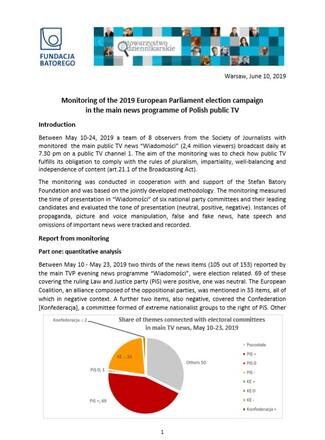
Related contents
Reuters Institute Digital News Report 2019New digital threats to media pluralism in the information age
DRI - Disinformation Resilience in Central and Eastern Europe
Junk News During the EU Parliamentary Elections: Lessons from a Seven-Language Study of Twitter and Facebook
Between May 10th-24th, 2019 a team of 8 observers from the Society of Journalists monitored the main public TV news “Wiadomości” (2.4 million viewers) broadcast daily at 7.30 pm on the public TV channel 1.
This article, a 4-page report published by the Stefan Baroty Foundation summarising the results of the monitoring, using quantitative and qualitative analysis. Both indicate that “Wiadomości” favoured the ruling party not only in number of mentions, but also in the quality of the language used to mention the opposition candidates, even using fake news, picture and sound manipulations.
- Quantitative analysis: with most news items related to elections (105 out of 153), coverage of the ruling Law and Justice party (PiS) was always positive, while for the European Coalition, an alliance of the opposition parties, it was always negative. Time measurement revealed a clear difference between ruling party and opposition leaders, with the PiS party leader being the most visible politician in the programme.
- Qualitative analysis: the analysis of content and communication strategy describes some interesting tools, from clustering of bad/good news to visual and sound manipulation, from misleading graphics to repetition of news and even omission of captions for opposition politicians, not marking them as “election candidates”. This monitoring discovered for example that news items were usually clustered according to the same undertone: positive news and opinion for the ruling party, and negative news and opinion about the opposition usually came in clusters of two, three or more news items presented one after the other. The repetition strategy was also spread on longer periods, repeating news items showing successes of the government policy and almost every day news items that criticised the performance of the opposition party. Fake news and omissions of news items that showed the ruling party in a bad light were also detected.
This monitoring report concludes that the programme “Wiadomości” “not only failed to fulfill the legal requirements of impartiality, balance, pluralism and independence, but also ran and exposed the ruling party propaganda materials which constitutes a violation of the Electoral law”.
Tags: Media freedom Media Law Poland Freedom of expression Media pluralismThe content of this article can be used according to the terms of Creative Commons: Attribution-NonCommercial 4.0 International (CC BY-NC 4.0) . To do so use the the wording "this article was originally published on the Resource Centre on Media Freedom in Europe" including a direct active link to the original article page.

